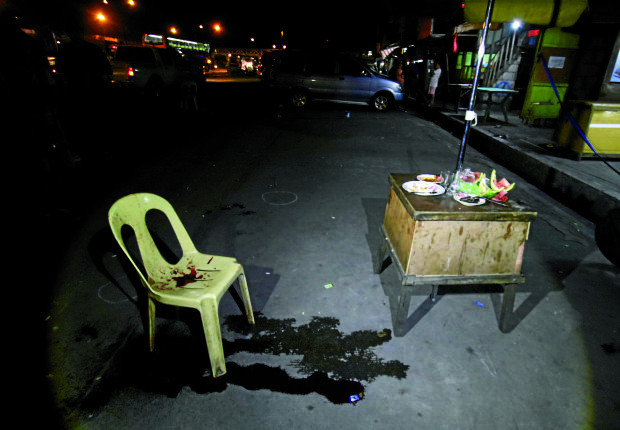PH killings top US human rights report

EMPTY CHAIR The crime scene where former guest relations officer Christina Padual (shown sprawled over a chair on Page A1) was killed by masked gunmen in front of Virgo Club, Barangay Holy Spirit, Quezon City. Also killed was her partner, alias “Melvin,” who was allegedly involved in drugs and was once arrested during a drug operation. —RICHARD A. REYES
The US Department of State has quietly released its annual report on human rights around the world, with the Philippines cited as a country where instances of extrajudicial killings have risen sharply and carried out with impunity.
The report, mandated by Congress, documents human rights conditions in nearly 200 countries and territories and is put together by staff in US embassies. But its release was overshadowed by criticism that Secretary of State Rex Tillerson gave the report little attention, breaking from traditional practice.
Tillerson declined to unveil the report in person on Friday, breaking a precedent established during both Democratic and Republican administrations. A senior US official, however, answered reporters’ questions on condition of anonymity.
According to the report, Philippine police and vigilantes “killed more than 6,000 suspected drug dealers and users” from July to December last year.
It noted that extrajudicial killings “increased sharply” in the period, even as the government officially does not tolerate human rights violations or state-sponsored killings.
Article continues after this advertisementThe Inquirer and other news organizations have reported a higher death toll of more than 8,000 since President Duterte took office last year.
Article continues after this advertisementThe report noted that “killings allegedly undertaken by vigilantes, security forces, and insurgents as the principal human rights abuse documented this year,” the official said.
“And it also chronicles apparent governmental disregard for human rights and due process, and a very weak and overburdened criminal justice system,” the official added.
The official noted that efforts to promote human rights were crucial to bilateral and defense ties, which were on the mend after President Duterte last year said he would scrap scheduled visits here by American troops as he looked to US rivals China and Russia for military assistance.
He has, however, stopped his verbal tirades against Washington after US President Donald Trump came into power.
The official said Tillerson would “review each arms transfer notification for the Philippine police and armed forces on a case-by-case basis.”
“Because it’s the right thing not to provide arms to units that are undermining … the value of human life,” the official said.
The 44-page report on the Philippines noted that while extrajudicial killings here were not new, they “increased sharply over the past year.”
It quoted Philippine National Police figures from July to December last year showing that 2,155 suspects were killed in police operations, and 4,049 others by unknown vigilantes.
It said the killings have raised concerns about “police impunity” following promises by authorities that cops involved would not be prosecuted.
The report also raised questions on the “accuracy and legitimacy” of the supposed drug list that President Duterte always carries and shows the public during his speeches.
The report also noted that President Duterte’s “public attacks on individuals and international bodies who have criticized his policies had a chilling effect on free speech and expression.”
It cited the case of Sen. Leila de Lima who herself has been jailed on drug-related charges after speaking out against the President.
But presidential spokesperson Ernesto Abella denied the state supported vigilante killings, even as he stressed the government was engaged in trying to arrest an “emerging narcostate” by battling drug lords.
“Vigilante or extrajudicial killings are unlawful and are therefore, not sanctioned,” he said. “The government condemns such practice. These are not to be confused with the government’s war on illegal drugs, which is an urgent and critical domestic matter.”
He said President Duterte has ordered law enforcement institutions to take “decisive legal steps” against cops embroiled in summary executions or with the drug trade. The government, he said, would “punish the scalawags in uniform.”
The secretary of state traditionally unveils the report with public comments emphasizing the centrality of human rights in US foreign policy and highlighting specific findings.
The report’s language on Russia for instance remained broadly similar to that of years past, noting the country’s “authoritarian political system dominated by President Vladimir Putin.”
Tillerson’s Democratic predecessors John Kerry and Hillary Clinton gave public comments on the report in 2013 and 2009, their first years in the post, respectively, and continued to present it throughout their tenures.
In 2005, during Republican President George W. Bush’s administration, the undersecretary of state for global affairs, Paula Dobriansky, presented the report on camera on behalf of Secretary of State Condoleezza Rice.
Human rights groups criticized the way the report was made public. —WITH A REPORT FROM THE WIRES